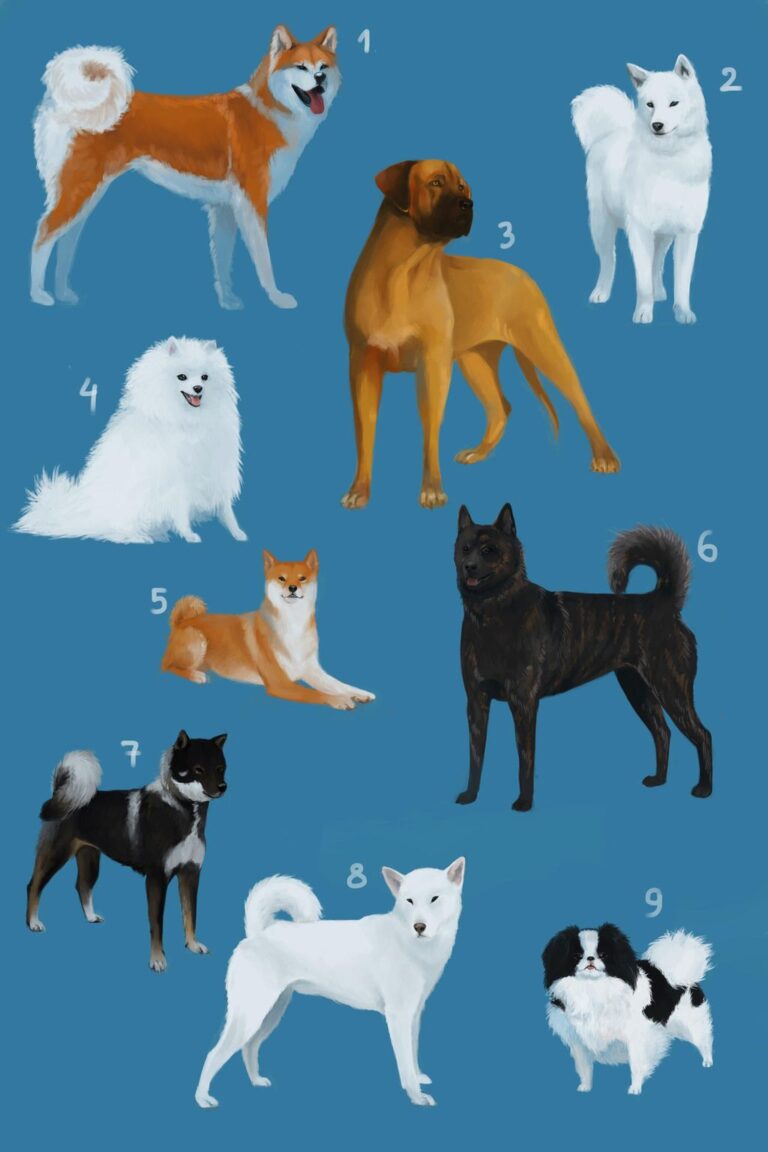Identifying Mixed Breed Dogs: Clues to Determine Your Canine’s Ancestry
When it comes to mixed breed dogs, their unique ancestry can often be a mystery. However, by understanding certain clues and characteristics, you can get a better idea of your canine companion’s lineage. From physical features to behavioral traits, there are several ways to identify mixed breed dogs. In this article, we will explore the fascinating world of canine ancestry and provide tips and tricks to help you determine your dog’s ancestry.
Key Takeaways
- Mixed breed dogs have a unique ancestry that can be determined through various clues.
- Physical characteristics such as size, coat type, and facial features can provide insight into a dog’s ancestry.
- Behavioral traits and temperament can also indicate the breeds present in a mixed breed dog.
- Health considerations should be taken into account when identifying a dog’s ancestry, as certain breeds may be prone to specific health issues.
- Genetic testing is a reliable method to unlock your dog’s DNA and determine its breed composition.
What’s in a Mix?

Understanding Mixed Breed Dogs
When it comes to mixed breed dogs, variety is the name of the game. These unique canines are a blend of different breeds, resulting in a one-of-a-kind furry friend. Unlike purebred dogs, mixed breeds don’t have a specific breed standard set by organizations like the AKC. This means that mixed breed dogs can come in all shapes, sizes, and colors, making them truly special.
Why Mixed Breed Dogs are Unique
When it comes to mixed breed dogs, there’s something truly special about them. Unique is the word that comes to mind. These dogs are a blend of different breeds, resulting in a one-of-a-kind canine companion. They possess a distinctive combination of traits and characteristics that make them stand out from purebred dogs.
One of the most fascinating aspects of mixed breed dogs is their unpredictability. You never know exactly what you’re going to get with a mixed breed. It’s like opening a surprise package and discovering a delightful mix of traits from different breeds. This unpredictability adds an element of excitement and surprise to owning a mixed breed dog.
Another reason why mixed breed dogs are unique is their diversity. With so many different breeds to choose from, the possibilities are endless. From the energetic and playful Labradoodle to the intelligent and loyal Goldendoodle, there’s a mixed breed dog out there for everyone.
In addition to their unique blend of traits, mixed breed dogs often have hybrid vigor. This means they may be less prone to certain genetic health issues that are common in purebred dogs. It’s like they have the best of both worlds, combining the strengths of different breeds and minimizing the weaknesses.
So, if you’re considering getting a dog and want a truly unique and special companion, a mixed breed dog might be the perfect choice for you.
The Fascinating World of Canine Ancestry
In the fascinating world of canine ancestry, we discover the rich tapestry of breeds that make up our beloved mixed breed dogs. These unique canines are a delightful blend of different breeds, each contributing their own distinct characteristics. Exploring their ancestry is like embarking on a thrilling adventure, uncovering the hidden secrets of their genetic makeup.
As we delve deeper into the world of mixed breed dogs, we begin to appreciate the complexity and diversity that exists within each individual. From their physical appearance to their behavioral traits, every aspect of a mixed breed dog tells a story of their heritage.
To better understand our furry friends, we can observe their physical characteristics. Noticing the shape of their ears, the color of their coat, or the size of their paws can provide valuable clues about their ancestry. These subtle details can help us piece together the puzzle of their genetic background.
In addition to physical features, a mixed breed dog’s behavior and temperament can also offer insights into their ancestry. Observing how they interact with other dogs, their level of energy, or their instinctual behaviors can shed light on the breeds that may be present in their lineage.
While physical characteristics and behavioral traits can provide valuable clues, it’s important to remember that genetic testing is the key to unlocking the true DNA of a mixed breed dog. With advancements in technology, we now have the ability to uncover the precise breeds that make up our furry companions. Genetic testing can provide a comprehensive report that reveals the unique blend of breeds that contribute to their one-of-a-kind personality.
So, whether you’re curious about your own mixed breed dog’s ancestry or simply fascinated by the world of canine genetics, exploring the fascinating world of canine ancestry is an adventure worth embarking on. Discovering the breeds that make up our mixed breed dogs not only deepens our understanding of them but also celebrates the diversity and uniqueness of each and every one.
Clues to Determine Your Dog’s Ancestry

Physical Characteristics
When it comes to identifying a mixed breed dog’s ancestry, physical characteristics play a crucial role. These unique traits can provide valuable clues about your furry friend’s heritage. From the shape of their ears to the color of their coat, every detail can give us insights into their genetic makeup. However, it’s important to note that breed ID requests based solely on physical appearance can be challenging, as mixed breed dogs can exhibit a wide range of features inherited from their diverse lineage.
Behavioral Traits
When it comes to identifying a mixed breed dog’s ancestry, behavioral traits can provide valuable clues. Dogs inherit certain behaviors from their ancestors, and these behaviors can manifest in unique ways in mixed breed dogs. Observing your dog’s behavior can help you understand their genetic background and gain insights into their breed makeup.
Here are some key behavioral traits to look out for:
- Energy level: Mixed breed dogs may exhibit a combination of energy levels from their parent breeds. Some may be high-energy and require lots of exercise, while others may be more laid-back.
- Temperament: Mixed breed dogs can inherit a range of temperaments from their parent breeds. They may be friendly and outgoing, reserved and shy, or somewhere in between.
- Instincts: Certain instincts, such as herding or hunting, can be passed down through generations. Observing your dog’s natural instincts can provide clues about their ancestral heritage.
Remember, every mixed breed dog is unique, and individual traits may vary. Understanding your dog’s behavioral traits can help you create a stronger bond and provide the best care for them.
Health Considerations
When it comes to health considerations for mixed breed dogs, there are a few important factors to keep in mind. While mixed breed dogs are generally known for their resilience and hybrid vigor, it’s still essential to be aware of potential health issues that may arise. Regular veterinary check-ups are crucial to ensure your dog’s well-being and catch any health problems early on. Additionally, it’s important to be aware of the common health conditions that may be prevalent in the parent breeds of your mixed breed dog. By understanding these potential health risks, you can take proactive steps to keep your furry friend healthy and happy.
Genetic Testing: The Key to Unlocking Your Dog’s DNA
When it comes to determining the ancestry of our beloved mixed breed dogs, genetic testing is an invaluable tool. With a simple DNA test, we can uncover the hidden secrets of their heritage and gain a deeper understanding of their unique traits and characteristics. Genetic testing allows us to identify the different breeds that make up our furry friends, giving us a glimpse into their diverse backgrounds.
Not only does genetic testing provide us with fascinating insights, but it also has practical benefits. By knowing the specific breeds in our dog’s ancestry, we can better anticipate their needs and tailor their care accordingly. For example, if we discover that our dog has a high risk for certain health conditions, we can take proactive measures to prevent or manage them.
In the past, genetic testing was a complex and expensive process that was only accessible to a select few. However, thanks to advancements in technology, it is now more affordable and readily available. There are several reputable companies in the USA Dog Shop that offer at-home DNA testing kits, making it convenient for dog owners to unlock the secrets of their pet’s DNA.
Popular Mixed Breed Combinations

Labradoodle: The Perfect Blend of Labrador and Poodle
Labradoodles are a unique and adorable mix of Labrador and Poodle. These lovable dogs have become increasingly popular due to their friendly and intelligent nature. They are known for their low-shedding coats, making them a great choice for individuals with allergies. Labradoodles are also highly trainable and excel in various activities such as obedience training and canine art. With their playful and affectionate personalities, Labradoodles make wonderful companions for families and individuals alike.
Goldendoodle: The Golden Retriever and Poodle Mix
When it comes to mixed breed dogs, the Goldendoodle is a popular choice among dog lovers. This adorable hybrid is a cross between a Golden Retriever and a Poodle, resulting in a lovable and intelligent companion. One of the fascinating aspects of the Goldendoodle is their unique combination of traits inherited from both parent breeds. DNA test kit can provide valuable insights into the genetic makeup of your Goldendoodle, helping you understand their ancestry and potential health considerations. By analyzing their DNA, you can uncover hidden traits and better care for your furry friend.
Cockapoo: The Cocker Spaniel and Poodle Mix
Cockapoos are a popular mixed breed dog that combines the Cocker Spaniel and Poodle. They are known for their friendly and affectionate nature, making them great canine companions. These adorable dogs have a unique coat that can range from curly to wavy, and they come in a variety of colors. Cockapoos are generally small to medium-sized dogs, making them suitable for both apartments and larger homes. They are highly adaptable and can thrive in different environments. Cockapoos are also known for their intelligence and trainability, which makes them easy to teach new tricks and commands.
Pomsky: The Pomeranian and Husky Mix
When it comes to mixed breed dogs, the Pomsky is a unique and adorable combination of the Pomeranian and Husky. This mix results in a small to medium-sized dog with a fluffy coat and striking blue eyes. Pomskies are known for their playful and energetic nature, making them a great choice for active families.
If you’re considering getting a Pomsky, there are a few things to keep in mind. First, their size can vary depending on the traits they inherit from their parents. Some Pomskies may be more Pomeranian-like, while others may resemble Huskies more. It’s important to do your research and understand the potential range of sizes and characteristics.
In terms of grooming, Pomskies require regular brushing to keep their coat looking its best. They may also shed, so be prepared for some fur around the house. Additionally, Pomskies are intelligent and active dogs that need mental and physical stimulation. Providing them with plenty of exercise and mental enrichment is essential for their well-being.
If you’re interested in getting a Pomsky, it’s important to find a reputable breeder who prioritizes the health and well-being of their dogs. Ask for references, visit the breeder’s facilities, and ensure that the puppies are raised in a clean and loving environment.
Remember, owning a Pomsky is a long-term commitment. They can live up to 15 years or more, so be prepared to provide them with love, care, and attention throughout their lives.
Identifying Mixed Breed Dogs: Tips and Tricks

Observing Physical Features
When it comes to identifying mixed breed dogs, observing physical features is a crucial step. By closely examining your furry friend’s appearance, you can uncover valuable clues about their ancestry. Look for distinctive characteristics that stand out, such as the shape of their ears, the color of their coat, or the size of their paws. These subtle details can provide hints about the breeds that make up their unique genetic makeup.
Analyzing Behavior and Temperament
When it comes to analyzing behavior and temperament in mixed breed dogs, we take a hands-on approach. We believe that understanding our furry friends’ personalities is key to providing them with the best care possible. Here are a few tips and tricks we’ve learned along the way:
- Observe their interactions: Pay close attention to how your dog interacts with other dogs and humans. Look for signs of friendliness, fear, or dog confrontation.
- Note their energy levels: Is your dog always full of energy or more laid-back? Understanding their energy levels can help you provide the right amount of exercise and mental stimulation.
- Consider their past experiences: A dog’s behavior can be influenced by their past experiences. If your dog has had negative encounters or trauma, it’s important to be patient and provide them with a safe and supportive environment.
- Seek professional guidance: If you’re unsure about your dog’s behavior or need help addressing specific issues, don’t hesitate to seek professional assistance. A qualified trainer or behaviorist can provide valuable insights and guidance.
Remember, every dog is unique, and their behavior and temperament can vary. By paying attention to these factors and seeking the right support, you can help your mixed breed dog thrive.
Researching Breed Characteristics
When it comes to researching breed characteristics, there are a few key factors to consider. First and foremost, it’s important to understand that every dog is unique, and mixed breed dogs are no exception. While they may have traits inherited from their purebred ancestors, they also possess their own distinct qualities that make them special.
One of the best ways to learn about your mixed breed dog’s ancestry is by talking to other dog owners who have similar breeds. They can provide valuable insights and share their experiences, giving you a better understanding of what to expect.
Another helpful resource is online forums and communities dedicated to mixed breed dogs. These platforms allow you to connect with other dog enthusiasts and exchange information about breed characteristics, behavior, and health considerations.
Additionally, consider reaching out to local veterinarians or animal shelters. They often have extensive knowledge and experience with mixed breed dogs and can offer guidance on identifying specific breed traits.
Remember, dog ownership is a journey of discovery, and researching breed characteristics is just one piece of the puzzle. Embrace the uniqueness of your mixed breed dog and enjoy the adventure!
Seeking Professional Assistance
When it comes to identifying mixed breed dogs, sometimes we need a little help from the experts. Professional assistance can provide valuable insights and guidance in determining your canine’s ancestry. Whether it’s a veterinarian, a dog breeder, or a canine geneticist, these professionals have the knowledge and experience to analyze your dog’s physical characteristics, behavior, and health considerations. They can also recommend genetic testing, which is the key to unlocking your dog’s DNA and discovering their unique mix of breeds.
In Conclusion
So there you have it! Identifying mixed breed dogs can be a fun and exciting journey. By understanding their unique characteristics, observing their physical features, analyzing their behavior, and even seeking professional assistance, you can uncover the fascinating world of your canine’s ancestry. Whether it’s a Labradoodle, Goldendoodle, Cockapoo, or Pomsky, each mixed breed combination brings its own blend of traits and charm. So embrace the mystery and embark on the adventure of discovering your furry friend’s heritage. Who knows, you might just uncover a surprising mix of breeds that make your dog even more special! Happy exploring!
Frequently Asked Questions
How can I determine if my dog is a mixed breed?
There are several ways to determine if your dog is a mixed breed. One way is to observe its physical characteristics and compare them to known breed traits. Another way is to analyze its behavior and temperament, as certain breeds have distinct personality traits. Additionally, genetic testing can provide definitive answers about your dog’s ancestry.
Can mixed breed dogs be registered?
Yes, mixed breed dogs can be registered with certain kennel clubs and organizations. However, the requirements and eligibility criteria may vary. It’s best to check with the specific kennel club or organization for their registration process and guidelines.
Are mixed breed dogs healthier than purebred dogs?
Mixed breed dogs often have a lower risk of inheriting genetic health issues compared to purebred dogs. This is known as hybrid vigor or the ‘healthier mix’ theory. By combining the gene pools of different breeds, mixed breed dogs may have a reduced likelihood of developing breed-specific health problems.
How accurate are genetic tests for determining a dog’s breed?
Genetic tests for determining a dog’s breed ancestry have become increasingly accurate in recent years. However, it’s important to note that no test is 100% perfect. Different tests may have varying levels of accuracy, and some breeds may have genetic markers that are more difficult to detect. It’s always recommended to consult with a veterinarian or geneticist for a comprehensive analysis of your dog’s DNA results.
Can mixed breed dogs participate in dog shows and competitions?
Yes, mixed breed dogs can participate in certain dog shows and competitions that allow mixed breeds. These events are often referred to as ‘mixed breed’ or ‘all breed’ shows. However, it’s important to check the specific rules and regulations of each event, as some may have restrictions or eligibility criteria for mixed breed entries.
How can I find out more about the breeds in my dog’s mix?
To find out more about the breeds in your dog’s mix, you can research breed characteristics and compare them to your dog’s physical and behavioral traits. Online resources, breed books, and breed-specific forums can provide valuable information. Additionally, genetic testing can reveal the specific breeds present in your dog’s ancestry.







3 Comments